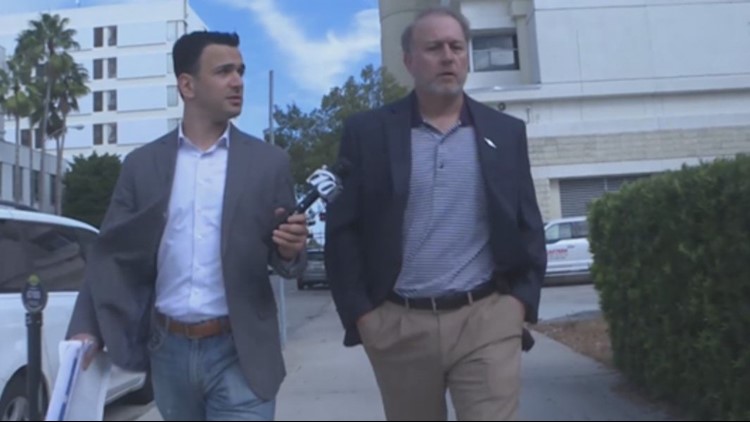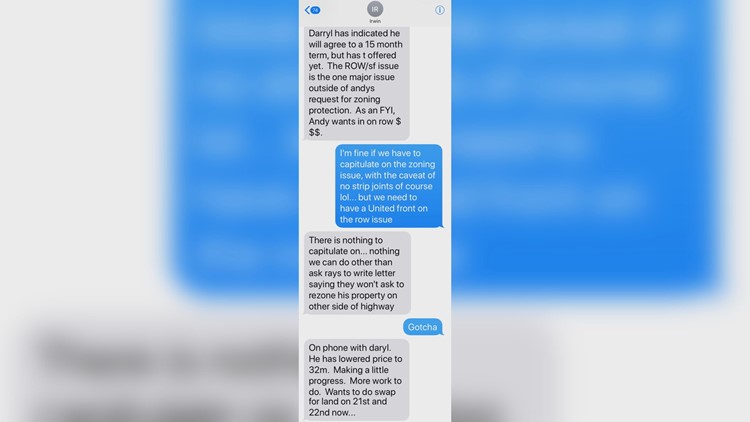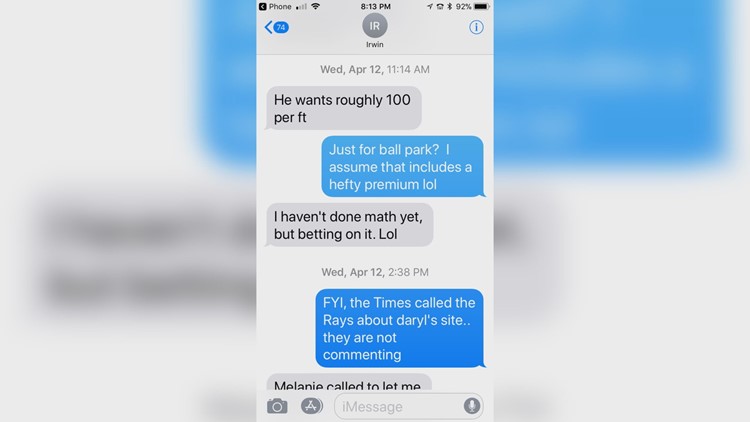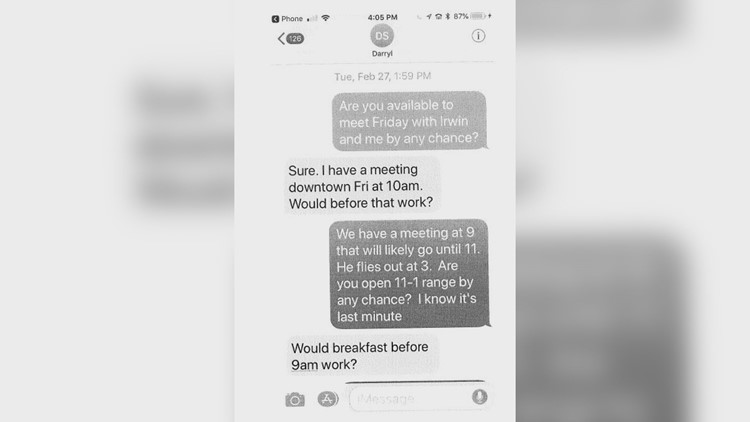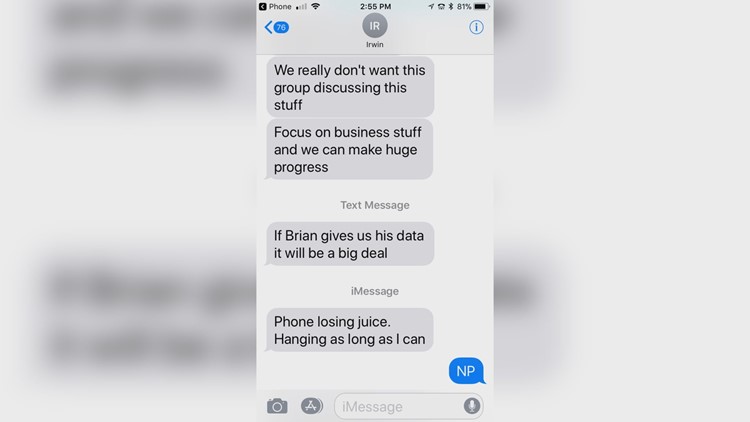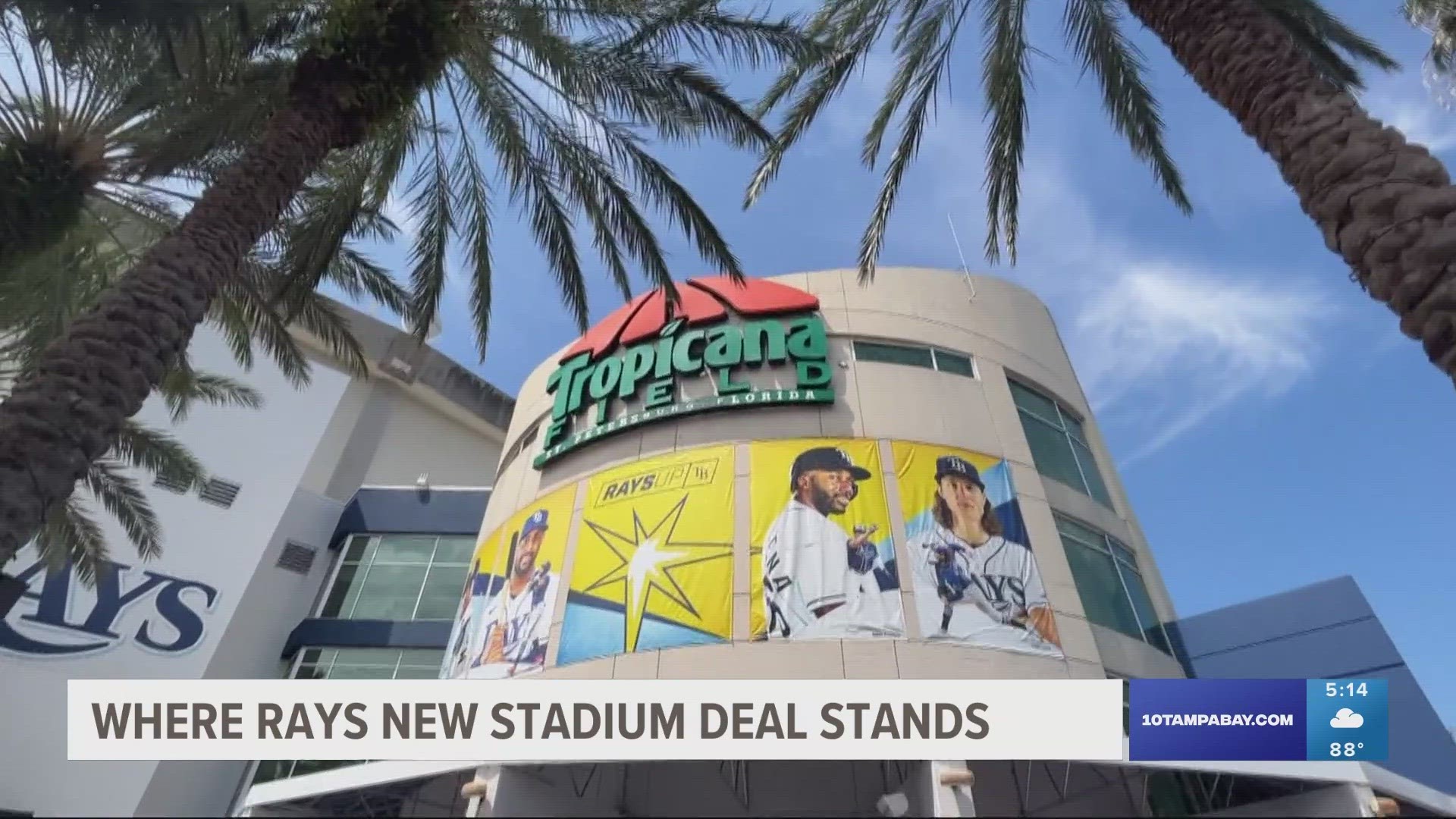TAMPA, Fla. – For years, county commissioner Ken Hagan has been negotiating a new Rays stadium behind closed doors, going so far to preserve secrecy that he refused to turn over public records even when the law required it.
However, the secret details of where Hagan and the Rays were planning to put a new stadium were not secret to every member of the public – one key developer had access to the information that should have been available to all. Hagan had a county staffer draw up maps of the exact location in Ybor City, where the team is now campaigning to put the stadium, as far back as 2016.
The developer used that information to buy land at a discounted rate, put himself in position to profit off the new stadium announcement, then became a significant contributor to Commissioner Hagan’s re-election campaign. At no time were Hagan’s fellow commissioners – or members of the public who requested the public documents – provided the maps.
Hagan also used outside law firms, hired by the county at an expense of a half million dollars over the past four years, to act as intermediary negotiators on a stadium deal. Text messages between Hagan and one attorney reveal how involved Hagan was in conversations and negotiations over land acquisitions - conversations Hagan denied having altogether.
10Investigates spent two years digging through property records, commission communications, and campaign records to unravel the complicated connections between Hagan and private developers. The commissioner repeatedly declined interview requests with one 10Investigates reporter, but agreed to a single 10News interview with another reporter in August. He refused to answer follow-up questions.
Hagan won his re-election by a slim margin, 52 percent to 48 percent, over a Democratic opponent he outraised by a 16-to-1 margin and outspent nearly 11-to-1. He continues to lead the negotiations between the county, the Rays, and developers who stand to profit from the deal. Details of the discussions, and the public dollars that may be involved, remain secret to Hagan’s fellow commissioners and constituents alike.
Picking the Ybor site, then keeping it secret
Hillsborough County first got permission to talk to the Rays about a possible Tampa stadium in January 2015. For more than two years, the targeted locations were a closely-guarded secret. Officials went to great lengths to avoid creating public records and to hide evidence of the meeting from public schedules.
Hagan, who once promised to be “as transparent and responsive as possible,” explained the secrecy was to ensure speculators wouldn’t buy up the land in question, driving up the cost of potential stadium property.
In actuality, Hagan and the Rays knew the exact land in Ybor City they would eventually design a ballpark; their secrecy only ensured specific speculators could grab the land for affordable prices – at the expense of landowners who didn’t know how valuable their land was about to become.


10Investigates repeatedly requested public records regarding the targeted stadium location, dating back to 2016, but Hagan responded each time that no records exist. However, county staff has confirmed records did exist at the time.
In April 2016, Hagan had an employee in the county’s maps department draw up renderings for a handful of proposed stadium sites – including the exact plot of land in Ybor City the Rays are now publicly targeting. County administrator Mike Merrill also confirmed the maps were shown to the team at the time.
Florida State Statute 119 requires Hagan to retain the documents for anyone who requests them, and Hillsborough commissioners are regularly briefed by the county attorney’s office on their public records responsibilities.
It wasn’t until October 2017 the team’s preferred location was released to the public: the exact same location and boundaries that were in Hagan’s April 2016 map. Property values in and around the targeted area soared, providing instant equity to developers who knew to buy up land in West Ybor.
Even now, a year after Hagan publicized the location, there has been no change in the secretive nature of talks. Hagan’s fellow commissioners tell 10Investigates they are not getting any updates about the stadium negotiations, even as a Dec. 31 deadline looms for the Rays to inform St. Petersburg of their future plans.
The commissioner and the outside counselor
In 2014, Hillsborough County quietly hired experienced law firm Foley & Lardner to represent it in stadium discussions, even though the county didn’t even have permission yet to talk to the Rays about a new stadium. At the time, Hagan told the Tampa Bay Times he wanted to send a message to the Rays and Major League Baseball “that we’re ready and we want the team.” The expert negotiator the county gained access to was attorney Irwin Raij.
Between October 2014 and October 2018, Hillsborough County paid Raij’s firms $496,359. Some of the principals from those firms donated to Hagan’s re-election campaign as well.
However, public records reviewed by 10Investigates suggest the closest relationship between Hagan and the outside counsel may be the negotiations the commissioner discusses with Raij. Text messages from 2017, obtained through public records requests, reveal regular communications between the men as they tried to assemble land in Ybor City for a new stadium.
Text messages: Hagan campaign donor got secret Rays stadium info
Text messages: Hagan campaign donor got secret info
While the location of the desired stadium was a secret to the public, it was not secret to developer Darryl Shaw. Hagan appeared to use Raij as an intermediary during the talks, as Shaw – and his well-connected partners – started buying up properties in and around the proposed stadium site at a time when nobody else was given access to the plans.
Hagan told 10Investigates in 2015 that he didn’t have any public texts to turn over at the time because he doesn’t text much. He also said in an August 2018 interview he hadn’t been involved in any negotiations over land. Neither is true.
Throughout 2017, Hagan and Raij regularly texted in between calls, emails, and meetings to discuss stadium progress.
That included texts in April 2017, where the two men appear to be discussing Shaw’s price demands, presumably for land he would profit off.
“He wants roughly 100 per ft,” Raij texted Hagan on April 12.
“Just for ball park? I assume that includes a hefty premium lol,” Hagan wrote back.
Hagan and Raij also talked extensively in 2017 about the secret plan to assemble Ybor City land purchase agreements through a newly-created nonprofit straw buyer. They discussed price of the purchases, right-of-way (ROW) issues, and looping then-county attorney Chip Fletcher into the conversation.
“Is the row issue the only one remaining? That’s a non starter for Chip,” Hagan texted Raij in September.
Raij texted back, “Darryl has indicated he will agree to a 15 month term, but has t (sic) offered yet. The ROW/sf issue is the one major issue outside of andys request for zoning protection. As an FYI, Andy wants in on row $$$.”
It appears Raij was referencing Andy Scaglione, a property developer who also owns land in - and around - the proposed stadium footprint.
Scaglione also serves on the Tampa Sports Authority board with Hagan, meaning the state's sunshine laws prohibits the two from coordinating on private discussions that may relate to the sports authority.
Subsequent texts between Hagan and Shaw involved discussions about county zoning policies and cash negotiations with Shaw.
“On phone with daryl (sic). He has lowered price to 32m. Making a little progress. More work to do,” Raij wrote on September 11, 2017, the day after Hurricane Irma struck Tampa Bay.
Hagan later claimed he had nothing to do with the purchase agreements.
Hagan and Raij also texted about:
- Whether then-sheriff David Gee would give up the land the Hillsborough County Sheriff’s Office was located to trade it with a developer for stadium land;
- Coordinating Hagan’s travel and tickets to the Braves’ new stadium outside Atlanta in July, plans the Rays were apparently involved in too;
- A “marked up Rays document” in November 2017, suggesting there were additional documents Hagan had access to. However, when those documents were requested, Hagan said none exist.
- Feeding misleading rumors to local reporters about land targets in order to leverage small landowners in Ybor City into signing option agreements.
Helping developers acquire land
Darryl Shaw, the founder of Blue Pearl Veterinary Partners, had been buying up tens of millions of dollars in blighted properties around Ybor City for years. Property records show corporations linked to Shaw closed on well over 100 parcels from 2014 to 2018.
However, Shaw’s focus appeared to have shifted sharply in 2016, from the less-developed East end of Ybor, to the West end of Ybor, where the Rays and Commissioner Hagan were secretly zoning in on a possible new stadium.
Shaw-controlled companies purchased one parcel within the small footprint of the proposed stadium in April 2016; two more in July 2016; another in Sept 2016; two in Nov 2016; plus a bevy of other properties immediately adjacent to the proposed stadium land in the same time period.
In July 2017, as Hagan was still keeping plans secret from the public, Shaw was able to close on another purchase within the stadium footprint, a small house that had been in the control of Tampa’s Cousins family for decades. The purchase price was $200,000 – approximately $45 per square foot – less than the $100 per square foot Raij mentioned to Hagan in his text message.
One family member told 10Investgiates they were approached by an attorney who said his group had planned to raze the home to make way for apartments. Had she known a deep-pocketed government and deep-pocketed corporation wanted to make it a baseball stadium, the family likely could have made more.
Instead, it was a different private citizen who stood to profit off the insider information: Shaw, who was negotiating with Raij on sale prices that Hagan suggested included “a hefty premium.”
Months later, in August 2017, companies controlled by Shaw and his wife contributed seven checks, each for the maximum-allowable $1,000 donation to Hagan’s re-election campaign, according to county election records. 10Investigates could not find any indication Shaw had ever donated to local candidates previously.
When Hagan announced the site of the proposed stadium in October 2017, real estate values skyrocketed, giving Shaw and his partners instant equity in the properties he recently purchased. It also put Shaw first in line to partner with – and profit off – a potential new stadium development.
Shaw declined numerous interview requests for this story over the course of several months.
UPDATE 11/20: Shaw responded two days after the story was published, saying he has spent years trying to redevelop Ybor City into a revitalized, livable community, and he will continue to do so with - or without - a stadium. He said a Rays stadium would be great at accelerating revitalization, but his initial talks about stadium land were all with the Rays and fellow developer Joe Capitano Sr., not Ken Hagan.
Shaw says the Rays are leading the negotiations, and not the county. However, county administrator Mike Merrill said Tuesday the county's attorney, Irwin Raij, was leading the negotiations, not the Rays or Shaw. A 2017 Tampa Bay Times story indicates Hagan was heavily-involved in securing the land agreements.
It looks bad. Is it illegal?
Hagan has faced a number of public records allegations in recent years, including possibly-deleted text messages related to a previous 10Investigates series. The Hillsborough County Sheriff’s office investigated missing records in 2015, but ultimately decided it did not have proof of intentional records destruction, which would be a criminal violation. Inadvertent destruction of records is not criminal in Florida.
Hagan has also been investigated by the Florida Commission on Ethics at least twice, pleading guilty in 2014 to failing to properly list his assets on an annual disclosure. The violation was not criminal, and Hagan payed a $2,000 fine.
Experts say the question of whether Hagan broke the law by failing to turn over public records related to the Rays stadium and coordinating with a private developer, who later became a campaign donor, depends on a number of factors.
“That causes me a great deal of concern,” said Sandy D’Alemberte, an attorney who previously served as president of both Florida State University and the American Bar Association. “The line ethically is at the point where you start dealing with a single developer and not informing other members of the (county) commission.”
D’Alemberte said, in his opinion, ethical lines were crossed and legal lines may have been blurred. Florida law prohibits public officials from disclosing information “not available to members of the general public and gained by reason of his or her official position” for personal gain {FSS 112.313 (8)}. Officials are also prohibited from using their positions “to secure a special privilege (or) benefit” {FSS 112.313 (6)} for themselves or their families.
“Here we have a commissioner operating alone, not disclosing to the commission the public transactions going on” D’Alemberte continued. “That screams out at you, doesn’t it?
“I understand (secrecy) is protecting the local government from extraordinary expenses, perhaps escalation in land prices. But it is a public official favoring one developer over another and not sharing information. Having someone selected only by that commissioner to benefit…troubles me a great deal.”
Ben Wilcox, research director for watchdog group Integrity Florida, says ethics violations are civil in nature and punishable with fines of up to $10,000. However, if law enforcement finds evidence of a quid pro quo where favors were exchanged, criminal corruption charges could follow.
“This should be thoroughly investigated,” Wilcox said. “The public’s money is being used to facilitate this deal, and for the public to have confidence their money is being used above-board, there needs to be complete transparency.
“The deal needs to be negotiated fairly, to where all potential developers have a chance to participate in it; not favoring one particular developer for his personal benefit.”
Hagan’s history with public records
Public records violations in Florida are typically only crimes if they were done willfully. Hagan, who has served on the Hillsborough County Commission for 16 years, has a history of public records mishaps that were passed off as inadvertent.
In 2015, 10Investigates exposed how Hagan refused to turn over text messages and emails he said didn’t exist – but some of which later turned up after an extended public records battle. The Hillsborough County Sheriff’s Office also found Hagan had destroyed messages on his phone that were likely public records. However, HCSO did not ever attempt to recover the messages forensically.
Hagan blamed county staffers for a breakdown in communication on public records requests, and subsequently got a motion passed to provide county commissioners with official government phones so their messages could be archived.
In 2017, 10Investigates exposed how Hagan was still using his personal phone, meaning the public still had to take the commissioner at his word that he was preserving all public records he created on the device.
Later in 2017, 10Investigates requested text messages from Hagan’s phone that he again failed to provide in a timely manner. When briefed of Hagan’s most recent public records controversies, D’Alemberte said all Floridians lose when public officials aren’t held to high standards on transparency.
“The Constitution of Florida requires us to be open, with open records and open meetings,” D’Alemberte said. “This just violates everything we know about Florida being ‘The Sunshine State.’”
Have any inside information you can share with 10Investigates' Noah Pransky? Send your story tips confidentially to Noah on Facebook or via email: npransky@wtsp.com.
►Interactive Timeline: Tap here to see 10Investigates' coverage of the Rays' stadium saga
►Make it easy to keep up-to-date with more stories like this: Download the 10News app now


